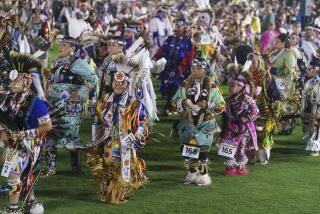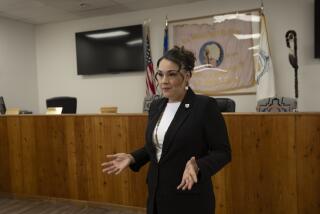High Court to Rule on State’s Role in Reservation Gambling Control
WASHINGTON — The Supreme Court, acting in a far-ranging dispute between California and two Indian tribes in Riverside County, agreed Monday to consider whether states may prohibit high-stakes bingo games and other commercial gambling on Indian reservations.
The justices said that they would hear an appeal from California officials, backed by 20 other states, of a ruling by a federal appellate court in San Francisco barring state and local authorities from enforcing anti-gambling laws against the Cabazon and Morongo bands of Mission Indians.
The games are supervised by non-Indian professional operators and are played primarily by non-Indians--with jackpots including cars, boats and cash awards of thousands of dollars.
State officials noted that there now are more than 100 unregulated tribal bingo operations in the nation--one-fourth of them in California--and expressed concern that such enterprises could be infiltrated by organized crime.
A decision by the justices, expected by early next year, could resolve conflicting lower-court rulings on the gambling issue and clarify the ability of states to regulate Indian commercial activity not subject to federal control.
The Supreme Court in 1983 upheld California’s right to regulate liquor sales on reservations by Indians to non-Indians. In 1980, the justices said that the state of Washington could tax on-reservation cigarette sales by Indians to non-Indians.
Meanwhile, two federal appeals courts have barred state regulation of Indian bingo games in California and Florida, while the supreme courts of Maine and Oklahoma have upheld such controls. Legislation is pending in Congress that would specifically allow bingo on reservations under federal regulations.
The 25-member Cabazon tribe and 800-member Morongo tribe live on desert land without natural resources and are beset by poverty and unemployment. Revenue from the bingo games and card games serves as the sole source of funds for tribal governments.
California law allows only charitable organizations to operate bingo games and limits jackpots to $250. The case arose when the tribes went to court seeking an injunction against enforcement of the state law and county ordinances against tribal bingo and card parlor games.
A federal district court issued such an injunction and the U.S. 9th Circuit Court of Appeals upheld it, saying that Indian tribes have an “inherent sovereign” right to conduct gambling for non-Indians on the reservations. The tribes’ interest in raising revenue outweighs the state’s interest in regulating gambling, the appellate court said.
State Atty. Gen. John K. Van de Kamp appealed the ruling to the Supreme Court. Van de Kamp defended the state law, saying that, while there is little chance of criminal activity in charitable bingo, there are “substantial risks” of organized-crime involvement where games offer high stakes and are not regulated.
Lawyers for the Cabazons and Morongos argued that bingo provides badly needed employment for tribal members and that the tribes take active roles in controlling the operations.
More to Read
Get the L.A. Times Politics newsletter
Deeply reported insights into legislation, politics and policy from Sacramento, Washington and beyond. In your inbox three times per week.
You may occasionally receive promotional content from the Los Angeles Times.










